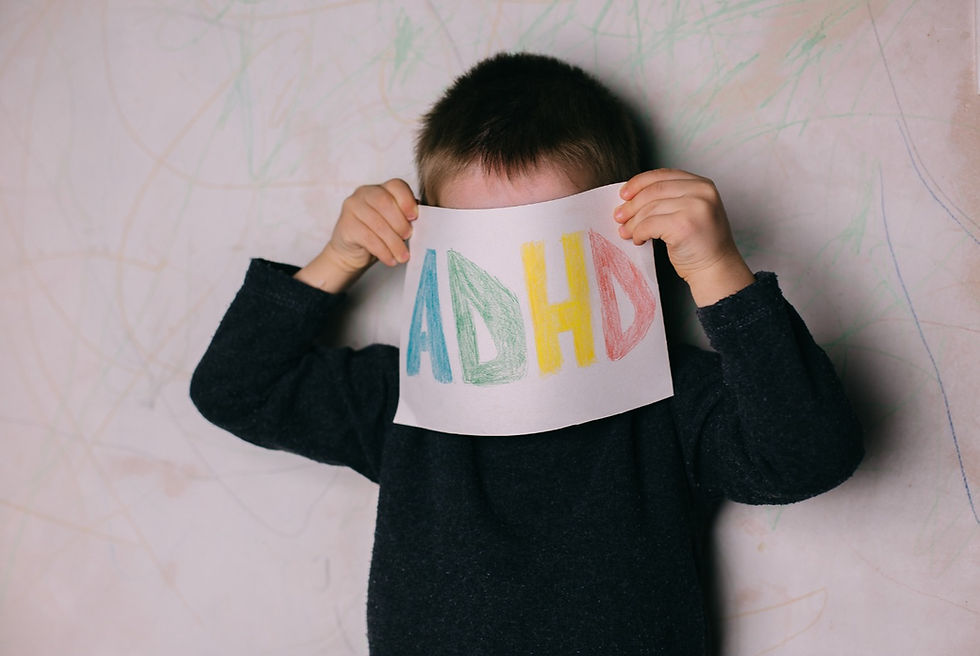ADHD
- Riz Q

- Jan 30, 2022
- 3 min read
Updated: Feb 1, 2022
Attention-Deficit Hyperactivity Disorder

ADHD characterised by attention deficit and hyperactive behaviour, is a developmental disorder of the central nervous system resulting in a mental disorder. ADHD often starts in children aged 3–6, and it can persist throughout the teenage years and even into adulthood. It is estimated that 6.4 million children are afflicted with ADHD in the US.
According to the World Health Organization, ADHD affects 7% of children and 2–5% of all adults worldwide.
What Are the Symptoms of ADHD ?
Talking incessantly Individuals with ADHD talk in a continuous manner and frequently interrupt others during conversations. They lack interest in listening, or they have no patience when other people speak.
Restlessness Individuals affected by ADHD have trouble focusing or completing projects, even in their hobbies.
Inattention Students with ADHD show inattention or lack of concentration in class or when reading.
Lack of problem-solving skills Persons with ADHD have trouble finishing simple tasks, particularly those that require problem-solving skills.
Lack of social skills Individuals with ADHD tend to interact with others in an awkward manner at school, in the workplace, or during social events.
Forgetfulness People with ADHD tend to routinely lose personal items, such as schoolwork, pens, books, purses, or cell phones.
Panic Lastly, persons diagnosed with ADHD often display uncontrollable anxiety, fear, and excessive nervousness.
WHAT ARE THE RISK FACTORS FOR ADHD?
• Family and Genetics ADHD is linked to genetics. Carriers of LPHN3 and CDHI3 gene polymorphic variants have an increased risk of ADHD. In studies of twins, having one twin with ADHD increased the risk of the other twin having ADHD by 70–80%. Children with a parent with ADHD have a 57% greater chance of having it as well.
• Alcohol Consumption During Pregnancy Alcohol consumption during pregnancy increases the risk of giving birth to a child with ADHD. Dopamine is an important neurotransmitter that fosters communication between the neurons in the brain. Alcohol reduces dopamine production in the fetal brain, which increases the risk of ADHD during childhood. Any amount of alcohol consumption during pregnancy is harmful to the fetus. Unfortunately, this concept is still not widely accepted.
• Premature Infants A preterm baby has a higher risk of ADHD. Babies that are severely underweight or overweight at birth have an elevated risk of ADHD. Insufficient blood perfusion in certain regions of the brain is common in children with ADHD. Those regions of the brain that are not adequately supplied with oxygen and nutrients are often the same regions that control behaviour and attention.
• Abused Children About 30% of ADHD adults are physically or sexually abused during childhood. Whether childhood abuse leads to ADHD or deviated behaviour associated with ADHD increases a child’s chance of being abused is still an open question.
What Is the Association between Omega-3 Fatty Acids and ADHD?
• Omega-3 fatty acids are essential nutrients that support development and neurotransmission in the central nervous system.
• Omega-3 fatty acids are the major components of phospholipids that form the bilayer structure of cellular membranes in neurons. They regulate membrane fluidity, which is crucial for the activity and functions of membrane proteins embedded in cell membranes. Omega-3 fatty acid deficiency increases the rigidity of the cell membrane, affects communication between the neurons, and causes developmental disorders and ADHD.

Meta-Analysis
Omega-3 fatty acids. A meta-analysis of 25 research papers conducted with 1,994 ADHD patients on the relationship between omega-3 fatty acids and ADHD confirmed that the blood level of omega-3 fatty acids was lower in ADHD patients compared to healthy controls. Supplementation with omega-3 fatty acids was found to significantly alleviate inattention and hyperactive behaviour in ADHD patients.
Recommendation
• Prevention For children at risk of attention-deficit/hyperactivity disorder, take daily 1 g omega-3 fatty acids.
• Treatment For children with attention-deficit/hyperactivity disorder, take daily 2 g omega-3 fatty acids.
Source: "THE VITAMIN CURE" Clinically Proven Remedies to Prevent and Treat 75 Chronic Diseases and Conditions



Comments